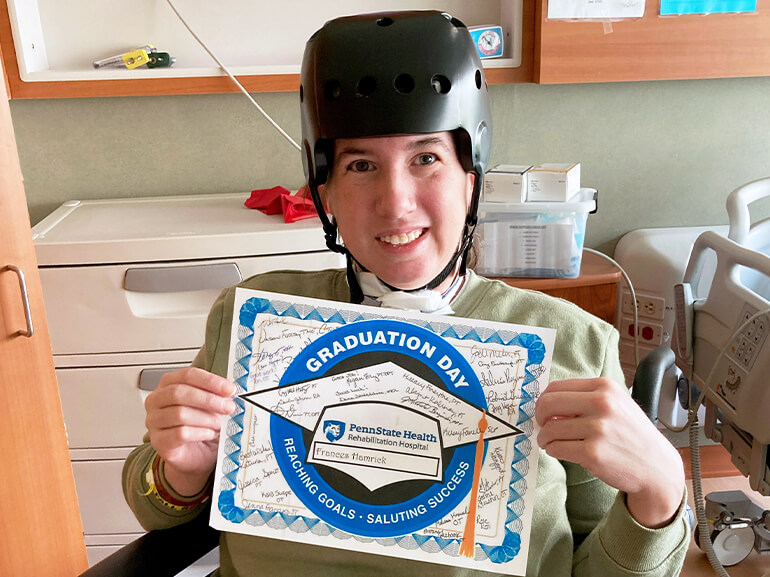Frances' story

Frances (Fran) Hamrick, was born in Virginia and now lives in Shippensburg, Pennsylvania. She works as a dietary aide at a local retirement village. In her spare time, Fran enjoys the outdoors, spending time fishing, traveling and playing with her dogs. Nearly every day, she walks six miles.
In January, Fran was on her way to her boyfriend’s house but never made it. Her parents, Phillip and Lorena, received a call from the emergency department of their local hospital notifying them Fran had a spontaneous bleed in the left side of her brain. At 43 years old, Fran had no prior illness other than complaining of headaches for several months. She spoke with her physician, and they developed a plan to manage what was believed to be stress or tension headaches. The sudden, serious diagnosis shocked her family.
In the emergency department, Fran went into respiratory failure. She was put on a ventilator and breathing tube. Her complex case required an emergency medical flight to a larger hospital, where she underwent further testing and treatment.
There, scans discovered an abnormality in the part of her brain where major blood vessels connect. She had a special procedure to stop the bleeding and help it drain. A portion of Fran’s skull was surgically removed to release pressure in her brain and reduce further damage to its lobes.
Unfortunately, complications set in. Following surgery, she developed a fever, had abnormal labs and a positive cerebrospinal fluid culture, indicating a developing infection. Additionally, Fran was diagnosed with pneumonia and a urinary tract infection, requiring treatment with multiple intravenous antibiotics. Fran’s medical team placed a feeding tube to provide nutrition and fluids since she had difficulty swallowing.
Several weeks after surgery, Fran was transferred to Select Specialty Hospital – York for extended recovery time. She required close supervision due to agitation and confusion caused by the trauma to her brain. During this hospital stay, Fran was successfully liberated from the ventilator and started an early mobility rehabilitation program. Its focus rebuilt core strength, improved circulation and breathing capabilities and enhanced alertness.
Over the next month, Fran continued to improve until it was time for the next step in her healing. Working with a Select Specialty Hospital social worker, she and her family chose Penn State Health Rehabilitation Hospital for its specialized brain injury program for further recovery.
Fran arrived at Penn State Health Rehabilitation Hospital unable to walk or fully breathe on her own. She had significant anxiety related to the tracheostomy tube placed for airway support, required tube feeds for nutrition and wore a helmet to protect the open spot on her skull. She had one goal when she arrived at the rehabilitation hospital -- learning to walk and talk again. However, she worried her struggles to heal meant it wasn’t possible.
After speaking with Fran and her parents, the interdisciplinary care team developed a specialized program that addressed each area affected by her brain injury.
In physical therapy, Fran practiced consistent and repetitious walking on smooth and uneven surfaces as well as navigating community-like environments with tasks such as turns and stop and go scenarios. Fran worked hard on her quality of walking including improving her walking speed, step length and stepping pattern to improve her fluency of walking. She also practiced ascending and descending stairs, which is necessary for her to return home.
During her occupational therapy sessions, Fran focused on daily living activities such as safely getting to the bathroom and completing her grooming and bathing tasks with limited assistance. This included practicing a variety of upper and lower body dressing techniques. Fran also enjoyed playing a variety of games to help with mobility, balance and coordination; bowling was a favorite.
Speech therapists assisted Fran in relearning how to swallow safely and was happy when she transitioned from tube feeding to a soft diet. In tandem, her rehab physician and nursing staff provided education on trach tube care and assured her no further surgery would be required when it was ready to be removed. The conversations reduced Fran’s anxiety.
“All of these people were very nice. I used to be scared of the stuff going on with me, but I ask them questions and they answer me every time,” she said. “I like to be challenged, and they taught me something new -- how to bowl. I’m getting better and faster.”
Fran was discharged from Penn State Health Rehabilitation Hospital a month later. Though her recovery journey wasn’t over, she left being able to walk with supervision, talk consistently and anticipated having the trach collar removed in the future. One more surgery – to replace the bone flap on her skull – was also planned.
Phillip and Lorena credit Penn State Health Rehabilitation Hospital’s dedicated team for helping quell Fran’s anxiety through thoughtful, consistent communication. She now is less fearful and anxious and understands how her injuries will heal.
Fran is also thankful for her parents who were very involved in her care, and she acknowledges they dedicated 100 percent to her recovery. Phillip and Lorena will now care for Fran in their home full-time.
When asked about heading home and what was next, Fran turned to her mom and gave her a big hug. Lorena said, “We will get through this together, Franny, like we always do.”